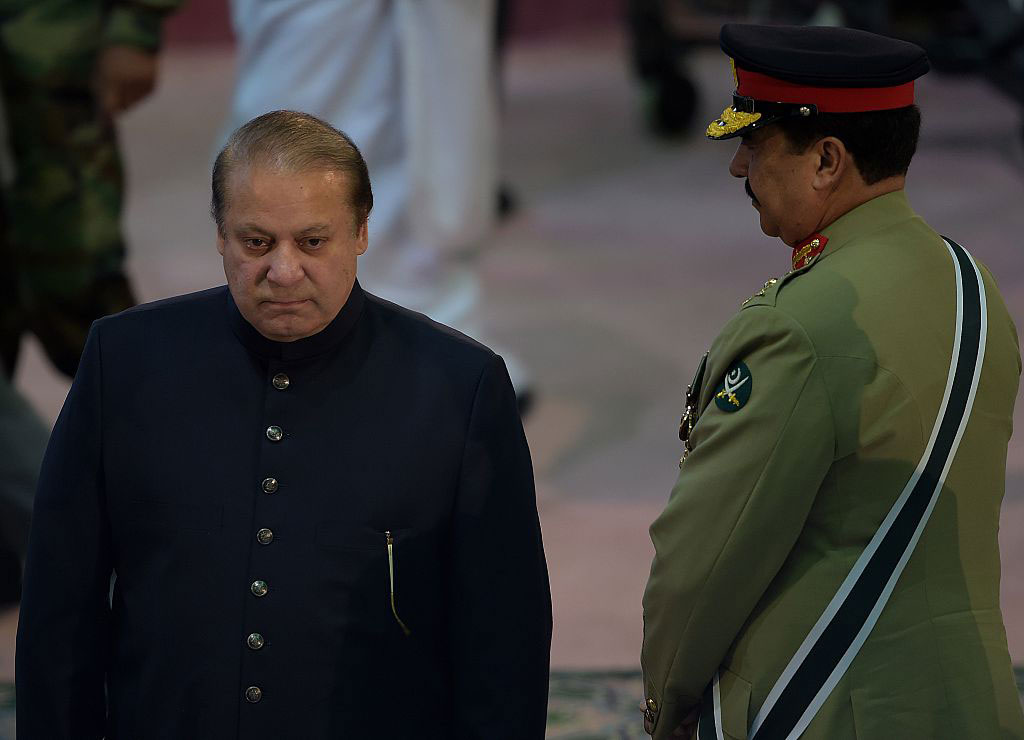by AHMED RASHID
 Pakistani Prime Minister Nawaz Sharif (left) and army chief General Raheel Sharif, Islamabad, Pakistan, August 14, 2015 PHOTO/Aamir Qureshi/AFP/Getty Images
Pakistani Prime Minister Nawaz Sharif (left) and army chief General Raheel Sharif, Islamabad, Pakistan, August 14, 2015 PHOTO/Aamir Qureshi/AFP/Getty Images
The suicide bomber who killed seventy-two people on Easter Sunday in a park in Lahore, Pakistan has drawn condemnation from around the world. Among the killed were twenty-nine children, and another 370 people were wounded, many of them members of the country’s Christian minority. Far less noted, however, has been the attack’s equally devastating effect on relations between Pakistan’s army and civilian government, which threatens to bring further instability to the country’s Punjab heartland.
At the heart of the crisis are two men, General Raheel Sharif, commander in chief of the Pakistan army, and Prime Minister Nawaz Sharif, head of the civilian government. For the past eighteen months, the two Sharifs (no relation) have maintained a tenuous political compact: the army—in some consultation with the prime minister—had overall control of Pakistan’s foreign and nuclear policy, as well as its counterterrorism strategy in Karachi, in the south, and along the border with Afghanistan, in the north. In turn, the civilian government could run the economy, and, most significantly, keep control of the prime minister’s home province of Punjab—the most populous region of the country, which includes the city of Lahore. Counterterrorism actions in Punjab were entrusted to the Punjab police rather than the army.
This compact ended hours after the bomb blast on the night of March 27. Almost immediately, the army declared it had taken control of security in the province, dealing a perhaps fatal blow to the already dwindling political prestige Prime Minister Sharif. The army told the media to emphasize that the orders for the Punjab operation were given directly by General Sharif and not the prime minister.
In fact, the army has no political, constitutional, or legal cover for going into Punjab. That would require the government to invite the army in. But over the past few days, as hundreds of arrests have taken place in Punjab, General Sharif and Nawaz Sharif have not met or apparently conferred with one another, adding to the uncertainty. Ashen-faced government ministers, brought on TV after the bombings, and even the prime minister himself, in his own speech, did not mention that the army had begun an operation in Punjab. For a country at war with extremists it was clear that there was no coordination or even a common strategy.
The result is an acute collapse of relations between the prime minister and the army chief, a dramatic breakdown of what Pakistanis call civil-military relations. In the past, such situations have led to the military imposing martial law on four occasions since 1958. How the current crisis plays out will be critical to the future of counterterrorism policy—and democracy itself—in south and central Asia.
Until this week’s bombing, Prime Minister Sharif had successfully rebuffed attempts by General Sharif to take over security in Punjab, including a direct request to do so in May 2015. But now, the stakes for Punjab have become much higher—for both Sharifs. The army has moved decisively over the past eighteen months to crush the Pakistani Taliban and the multiple Taliban factions that operated in Karachi, in the province of Khyber Pakhtunkhwa, and in the tribal belt adjacent to Afghanistan. Yet it is Punjab, where there are an estimated sixty Islamic extremist groups and over 20,000 madrassas or religious schools—some of which produce militants and spew extremist ideologies—that has become the central hub of terrorism in Pakistan.
Since the 1980s, many of Pakistan’s extremist groups have been sponsored and trained by the army’s intelligence services to fight for control of Indian Kashmir or, on occasion, to attack other Indian targets. Such support from the military has now mostly ended. But the real test of General Sharif’s determination to root out terrorism from Pakistan has always been in Punjab. Is the army now willing to turn on its former extremist allies and crush them, in what is now a very complex situation?
Several of the most deadly groups in Punjab are now trying to overthrow the state, among them Jamaat-ul-Ahrar, the group behind the Lahore park bombing. Jamaat-ul-Ahrar is openly sectarian and has targeted the army and Christians in particular. But Punjab also hosts dozens of anti-India extremist groups that have been supported by the army in the past. These include the well-trained and heavily-armed Lashkar-e-Tayabba (LT), which was responsible for the 2008 Mumbai attacks and which is listed by the UN and the US as a terrorist group.
Since the September 11 attacks fifteen years ago, LT has been helped by state institutions and the army to evolve into an Islamic charity, although it has been able to sustain its militant wing, even since it carried out the Mumbai attacks. While the army has stopped LT and other groups from launching attacks into India, many LT fighters are now openly fighting in Afghanistan alongside the Taliban or helping extremist groups from Uzbekistan and Tajikstan regain footholds in their homelands.
The New York Review of Books for more
(Thanks to reader)
